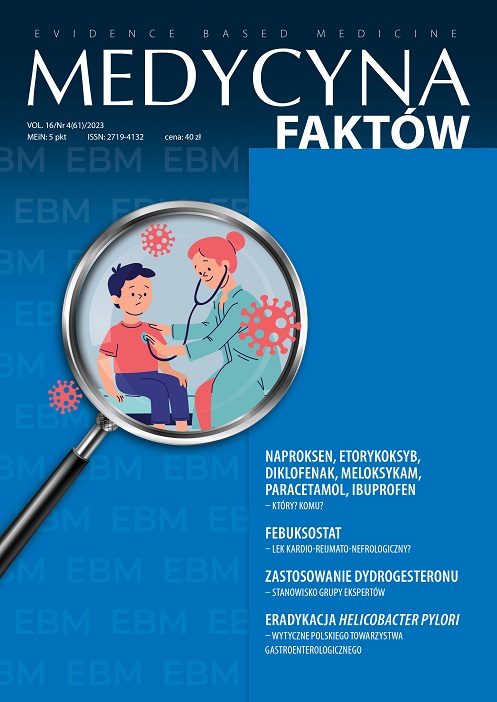Wczesne stosowanie progesteronu w prewencji wybranych powikłań położniczych Opis przypadku
##plugins.themes.bootstrap3.article.main##
Abstrakt
Forma dopochwowa progesteronu zmniejsza ryzyko poronień u kobiet, które doświadczyły podobnych powikłań. Najlepsze wyniki można uzyskać dzięki zastosowaniu jej w pierwszym trymestrze ciąży. Bardzo obiecujące wyniki otrzymano także w prewencji stanu przedrzucawkowego.
##plugins.themes.bootstrap3.article.details##
Jak cytować
Kwiatkowski, S. (2023). Wczesne stosowanie progesteronu w prewencji wybranych powikłań położniczych . Medycyna Faktów , 16(4(61), 410-413. https://doi.org/10.24292/01.MF.0423.19
Numer
Dział
Artykuły
Copyright © by Medical Education. All rights reserved.
Bibliografia
1. Boelig RC. Obstetric Indications for Progestin Therapy. Obstet Gynecol Clin North Am. 2023; 50(1): 101-7. http://doi.org/10.1016/j.ogc.2022.10.004.
2. Sitruk-Ware R, El-Etr M. Progesterone and related progestins: potential new health benefits. Climacteric. 2013; 16(suppl 1): 69-78. http://doi.org/10.3109/13697137.2013.802556.
3. Motomura K, Miller D, Galaz J et al. The effects of progesterone on immune cellular function at the maternal-fetal interface and in maternalcirculation. J Steroid Biochem Mol Biol. 2023; 229: 106254. http://doi.org/10.1016/j.jsbmb.2023.106254.
4. Choi SJ. Use of progesterone supplement therapy for prevention of preterm birth: review of literatures. Obstet Gynecol Sci. 2017; 60(5): 405-20. http://doi.org/10.5468/ogs.2017.60.5.405.
5. Rolnik DL, Wright D, Poon LC et al. Aspirin versus placebo in pregnancies at high risk for preterm preeclampsia. N Engl J Med. 2017; 377(7): 613-22.
6. Ghesquiere L, Guerby P, Marchant I et al. Comparing aspirin 75 to 81 mg vs 150 to 162 mg for prevention of preterm preeclampsia: systematic review and meta-analysis. Am J Obstet Gynecol MFM. 2023; 5(7): 101000. http://doi.org/10.1016/j.ajogmf.2023.101000.
7. Melo P, Devall A, Shennan AH et al. Vaginal micronised progesterone for the prevention of hypertensive disorders of pregnancy: A systematic review and meta-analysis. BJOG. 2023: http://doi.org/10.1111/1471-0528.17705.
8. Coomarasamy A, Devall AJ, Cheed V et al. A randomized trial of progesterone in women with bleeding in early pregnancy. N Engl J Med. 2019; 380(19): 1815-24.
9. Coomarasamy A, Williams H, Truchanowicz E et al. A randomized trial of progesterone in women with recurrent miscarriages. N Engl J Med. 2015; 373(22): 2141-8.
10. McLindon LA, James G, Beckmann MM et al. Progesterone for women with threatened miscarriage (STOP trial): a placebo-controlled randomized clinical trial. Hum Reprod. 2023; 38(4): 560-8.
11. ESHRE Guideline Group on RPL; Bender Atik R, Christiansen OB et al. ESHRE guideline: recurrent pregnancy loss. Hum Reprod Open. 2018; 2018(2): hoy004. http://doi.org/10.1093/hropen/hoy004
12. ESHRE Guideline Group on RPL; Bender Atik R, Christiansen OB et al. ESHRE guideline: recurrent pregnancy loss: an update in 2022. Hum Reprod Open. 2023; 2023(1): hoad002. http://doi.org/10.1093/hropen/hoad002.
13. Hennessy M, Dennehy R, Meaney S et al. Clinical practice guidelines for recurrent miscarriage in high-income countries: a systematic review. Reprod Biomed Online. 2021; 42(6): 1146-71. http://doi.org/10.1016/j.rbmo.2021.02.014.
14. Bulletti C, Bulletti FM, Sciorio R et al. Progesterone: The Key Factor of the Beginning of Life. Int J Mol Sci. 2022; 23(22): 14138. http://doi.org/10.3390/ijms232214138.
15. Wise J. NICE recommends progesterone to prevent early miscarriage. BMJ. 2021; 375: n2896. http://doi.org/10.1136/bmj.n2896.
2. Sitruk-Ware R, El-Etr M. Progesterone and related progestins: potential new health benefits. Climacteric. 2013; 16(suppl 1): 69-78. http://doi.org/10.3109/13697137.2013.802556.
3. Motomura K, Miller D, Galaz J et al. The effects of progesterone on immune cellular function at the maternal-fetal interface and in maternalcirculation. J Steroid Biochem Mol Biol. 2023; 229: 106254. http://doi.org/10.1016/j.jsbmb.2023.106254.
4. Choi SJ. Use of progesterone supplement therapy for prevention of preterm birth: review of literatures. Obstet Gynecol Sci. 2017; 60(5): 405-20. http://doi.org/10.5468/ogs.2017.60.5.405.
5. Rolnik DL, Wright D, Poon LC et al. Aspirin versus placebo in pregnancies at high risk for preterm preeclampsia. N Engl J Med. 2017; 377(7): 613-22.
6. Ghesquiere L, Guerby P, Marchant I et al. Comparing aspirin 75 to 81 mg vs 150 to 162 mg for prevention of preterm preeclampsia: systematic review and meta-analysis. Am J Obstet Gynecol MFM. 2023; 5(7): 101000. http://doi.org/10.1016/j.ajogmf.2023.101000.
7. Melo P, Devall A, Shennan AH et al. Vaginal micronised progesterone for the prevention of hypertensive disorders of pregnancy: A systematic review and meta-analysis. BJOG. 2023: http://doi.org/10.1111/1471-0528.17705.
8. Coomarasamy A, Devall AJ, Cheed V et al. A randomized trial of progesterone in women with bleeding in early pregnancy. N Engl J Med. 2019; 380(19): 1815-24.
9. Coomarasamy A, Williams H, Truchanowicz E et al. A randomized trial of progesterone in women with recurrent miscarriages. N Engl J Med. 2015; 373(22): 2141-8.
10. McLindon LA, James G, Beckmann MM et al. Progesterone for women with threatened miscarriage (STOP trial): a placebo-controlled randomized clinical trial. Hum Reprod. 2023; 38(4): 560-8.
11. ESHRE Guideline Group on RPL; Bender Atik R, Christiansen OB et al. ESHRE guideline: recurrent pregnancy loss. Hum Reprod Open. 2018; 2018(2): hoy004. http://doi.org/10.1093/hropen/hoy004
12. ESHRE Guideline Group on RPL; Bender Atik R, Christiansen OB et al. ESHRE guideline: recurrent pregnancy loss: an update in 2022. Hum Reprod Open. 2023; 2023(1): hoad002. http://doi.org/10.1093/hropen/hoad002.
13. Hennessy M, Dennehy R, Meaney S et al. Clinical practice guidelines for recurrent miscarriage in high-income countries: a systematic review. Reprod Biomed Online. 2021; 42(6): 1146-71. http://doi.org/10.1016/j.rbmo.2021.02.014.
14. Bulletti C, Bulletti FM, Sciorio R et al. Progesterone: The Key Factor of the Beginning of Life. Int J Mol Sci. 2022; 23(22): 14138. http://doi.org/10.3390/ijms232214138.
15. Wise J. NICE recommends progesterone to prevent early miscarriage. BMJ. 2021; 375: n2896. http://doi.org/10.1136/bmj.n2896.
